Level 11 modifiers 3rd - Study guides, Class notes & Summaries
Looking for the best study guides, study notes and summaries about Level 11 modifiers 3rd? On this page you'll find 29 study documents about Level 11 modifiers 3rd.
Page 3 out of 29 results
Sort by
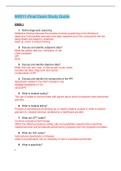
-
(2020/2021) | NR511-Final Exam Study Guide | COMPLETE DETAILED SOLUTION | Download To Score An A+
- Exam (elaborations) • 50 pages • 2021
- Available in package deal
-
- $10.99
- 1x sold
- + learn more
NR511-Final Exam Study Guide WEEK 1 1. Define diagnostic reasoning Reflective thinking because the process involves questioning one's thinking to determine if all possible avenues have been exp lored and if the conclusions that are being drawn are based on evidence. Seen as a kind of critical thinking. 2. Discuss and identify subjective data? What the patient tells you, complains of, etc. Chief complaint HPI ROS 3. Discuss and identify objective data? What YOU can see, hear, or feel as part of ...

-
(SOLVED) NURSING 3365 Course Map Exam 1&2 | Questions and Answers (100 out of 100) | University of Texas
- Exam (elaborations) • 30 pages • 2021
- Available in package deal
-
- $10.99
- + learn more
(SOLVED) NURSING 3365 Course Map Exam 1&2 | Questions and Answers (100 out of 100) What you should master to move forward from pharmacology: Start studying from day one with this document, your drug templates, and my PowerPoint’s. Use the textbook to add anything that is still not clear. This will be the document I will use in our pre-exam concept Reviews 1. FDA process for drug approval (legal) a. Phases I, II, II, clinical trials b. Which Trial does the drug have to pass to be deemed safe an...

-
NURS 231 -Pathophysiology exam -module 1 to module 10-2022-2023.
- Exam (elaborations) • 89 pages • 2022
-
Available in package deal
-
- $16.49
- + learn more
NURS 231 -Pathophysiology exam module 1 to module 10 2022/2023 NURS 231 -Pathophysiology exam -module 1 to module 10-2022/2023 Module 1 Exam Question 1 0 / 2.5 pts True/False: A bodybuilder’s muscles will display hyperplasia. True Correct Answer False Question 2 2.5 / 2.5 pts True/False: During pregnancy, uterine enlargement is caused by hypoplasia. True False It’s hy...
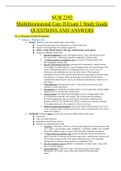
-
NUR 2392 Multidimensional Care II Exam 1 Study Guide QUESTIONS AND ANSWERS
- Exam (elaborations) • 21 pages • 2022
-
- $9.99
- + learn more
NUR 2392 Multidimensional Care II Exam 1 Study Guide QUESTIONS AND ANSWERS Ch. 21: Principles of Cancer Development • Benign vs. Malignant cells o Benign: Harmless; does not usually require intervention ▪ Normal cells growing in the wrong place or at the wrong time ▪ Result of small problem with cellular regulation ▪ Moles, uterine fibroid tumors, skin tags, endometriosis, nasal polyps ▪ Features of Benign Tumor Cells Specific morphology occurs with benign tumors. They look ...

-
Japanese Language
- Presentation • 4 pages • 2022
-
- $8.19
- + learn more
Japanese language From Wikipedia, the free encyclopedia Jump to navigationJump to search Not to be confused with Javanese language. "Nihongo" redirects here. Not to be confused with Nihonga. Japanese 日本語 にほんご ニホンゴ nihongo N The kanji for Japanese (read nihongo) Pronunciation /nihoNɡo/: [ɲihoŋɡo] Native to Japan Ethnicity Japanese (Yamato) Native speakers ~128 million (2020)[1] Language family Japonic Japanese Early forms Old Japanese Early Middl...
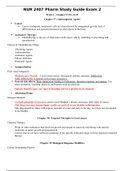
-
NUR 2407 Pharm Study Guide Exam 2 Week 4 – Chapter 37-39, 32-33-
- Exam (elaborations) • 32 pages • 2021
- Available in package deal
-
- $20.49
- + learn more
NUR 2407 Pharm Study Guide Exam 2 Week 4 – Chapter 37-39, 32-33 Chapter 37: Antineoplastic Agents • Cancer • Cancer (malignant, neoplastic) cells are characterized by unregulated growth, lack of differentiation and spread (metastasis) to other places in the body. • Anticancer Therapy: • Chemotherapy is the use of chemicals to kill cancer cells by inhibiting or preventing cell reproduction. Classes of Chemotherapy Drugs: - Alkylating Agents - Antimetabolites - Antitumor A...
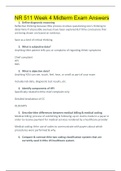
-
NR 511 Week 4 Midterm Exam Answers,100% CORRECT
- Exam (elaborations) • 48 pages • 2021
-
- $18.49
- + learn more
1. Define diagnostic reasoning 2. What is subjective data? 3. What is objective data? 4. Identify components of HPI 5. Describe thhe differences between medical billing & medical coding. 6. Compare & contrast thhe two coding classification systems that are currently used in thhe US healthcare system. 7. How do specificity, sensitivity, & predictive value contribute to thhe usefulness of diagnostic data? 8. Discuss thhe elements that need to be considered when developin...
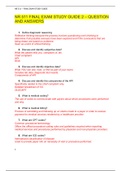
-
NR 511 FINAL EXAM STUDY GUIDE 2 – QUESTION AND ANSWERS
- Case • 49 pages • 2021
-
- $9.49
- + learn more
NR 511 FINAL EXAM STUDY GUIDE 2 – QUESTION AND ANSWERS 1. Define diagnostic reasoning Reflective thinking because the process involves questioning one's thinking to determine if all possible avenues have been explored and if the conclusions that are being drawn are based on evidence. Seen as a kind of critical thinking. 2. Discuss and identify subjective data? What the patient tells you, complains of, etc. Chief complaint HPI ROS 3. Discuss and identify objective data? Wha...
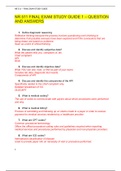
-
NR 511 FINAL EXAM STUDY GUIDE 1 – QUESTION AND ANSWERS
- Case • 49 pages • 2021
-
- $9.99
- + learn more
NR 511 FINAL EXAM STUDY GUIDE 1 – QUESTION AND ANSWERS 1. Define diagnostic reasoning Reflective thinking because the process involves questioning one's thinking to determine if all possible avenues have been explored and if the conclusions that are being drawn are based on evidence. Seen as a kind of critical thinking. 2. Discuss and identify subjective data? What the patient tells you, complains of, etc. Chief complaint HPI ROS 3. Discuss and identify objective data? Wha...

How did he do that? By selling his study resources on Stuvia. Try it yourself! Discover all about earning on Stuvia


